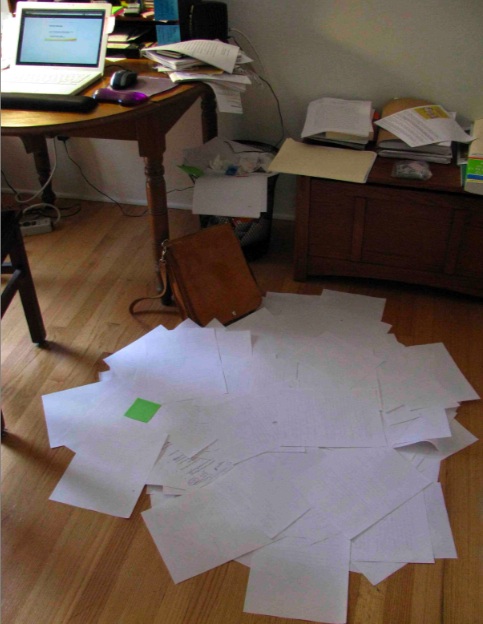co-authored with Douglas Dechow
Do you know the difference between writer and author? Do you know why you should never answer the question What's your book about? Our piece entitled "5 Takeaways from the Writer's Digest Conference" can be found at Lofty Ambitions blog.
But there's more! Here are five additional secrets from the insiders in publishing to writers everywhere who want to be authors.
1. There is no book in your mind.
Acclaimed novelist Aimee Bender said this during her keynote talk at the Writer's Digest Conference West. It's among the best wisdom we've heard in a long time.
"Thinking and writing are different," Bender said. You may have great ideas in your mind, but "the only book that exists is the one on the page." The process of writing is not one of translating your thoughts onto the page. No, it's the other way around. "Writing gives us access to our own minds."
Many writers--from Flannery O'Connor to E. M. Forster to Joan Didion--have talked about how they don't know what they think until they've written it down. Writers must work from the page, not from their intentions, if they hope to finish writing a book.
2. The bait must taste good to the fish not to the fisherman.
This good advice comes from screenwriter Richard Krevolin. Though it makes perfect sense, it's difficult advice to swallow because it means that it doesn't matter how much you like what you've written. Your writing must appeal to someone else if you want to be an author. An agent, an editor, and readers must find your writing savory.
What does it mean on the page for the writer? It certainly means that the first chapter matters, that you have to hook the reader right away and not let him look the other way. You may need to make life more difficult for your protagonist even if you like that character and you're a nice person who doesn't want to put others in harm's way. You may need revise--and revise again and again--instead of sending out a manuscript that's merely complete and not yet really compelling.
3. Don't wrestle gators if you're not a good gator-wrestler.
 That's how novelist and game designer Chuck Wendig put it, and consultant Rob Eagar gave similar advice. This tidbit is actually a relief because it means that an author doesn't have to follow all of the advice. An author should make smart choices about how to spend his or her time, especially when it comes to the public relations part of authorship.
That's how novelist and game designer Chuck Wendig put it, and consultant Rob Eagar gave similar advice. This tidbit is actually a relief because it means that an author doesn't have to follow all of the advice. An author should make smart choices about how to spend his or her time, especially when it comes to the public relations part of authorship.
If you absolutely can't put any idea into 140 characters, don't tweet. If you hate people, don't do public appearances. (If you hate crowds, public readings are probably okay until you get really famous.) If you resent that blogging is time that's not spent on your book, hit that delete this blog button. Don't waste your time on tasks you hate or that aren't working.
There are plenty of options, so do what you do best. And that means, first and foremost, keep writing.
4. Play nice with booksellers.
There exist four big booksellers that drive the market: Amazon, Barnes & Noble, Target, and Walmart. Independent bookstores matter, too. Authors must play nice with all of them.
That means, for one thing, putting purchase buttons on your author website. (And yes, an author needs a website.) Don't forget Barnes & Noble. If you do, the buzz is that they'll forget you. That's right, when deciding which books to order, Barnes & Noble may pass on yours if your website doesn't include a link to purchase your book from their online store.
The relationship between authors and booksellers works two ways, so take advantage. Amazon and Barnes & Noble allow authors to post book trailers. Barnes & Noble, to their competitive credit, is offering freebies, whereas Amazon is charging a hefty fee for a limited number of days--though these policies change like the weather. If you're an author without an Amazon author page, get on that at Author Central. It works like an extra website dedicated to you, and you can even check your BookScan numbers behind the scenes.
5. Be a fountain, not a drain.
This tidbit of wisdom is another from Chuck Wendig, though we heard specific iterations of how to be a giver-not-a-taker from agents, too. Wendig also put it another way: "Don't be a dick." You want people, especially your audience, to interact with you. We're all in this together--all of us writers. And readers. And agents and editors too.
What we're talking about here is literary citizenship. It's a term bandied about by authors such as Dinty Moore and Cathy Day. It's the sort of contributing to the literary community that writer and editor Kate Gale emphasized during her recent talk in the Tabula Poetica Reading Series. At the most basic level, literary citizenship calls for writers to buy books and periodicals, read books and periodicals, and talk about books and periodicals with other people. That creates the enthusiasm upon which all authors--and ultimately a vibrant culture--depend.
